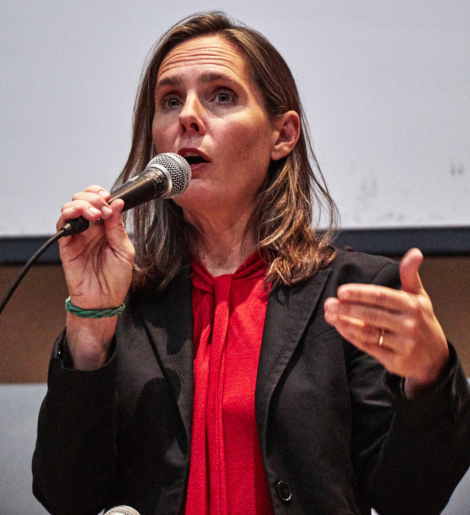Voters across Toronto are heading to the ballot boxes today to choose their next municipal leaders. Despite being the most prominent mayoral contenders, John Tory and Jennifer Keesmaat aren’t the only candidates running to lead Toronto.
Sarah Climenhaga, a safe streets advocate, registered to run for Mayor of Toronto the moment nominations opened at 8:30 am on May 1. Five months later, she said that the campaign has been going well, and that she has been able to drum up grassroots support through social media and public appearances. At the same time, however, she noted the lack of media attention on her candidacy.
“I have never really been able to break into the media, and without regular media coverage, it’s just too difficult to reach all of the Torontonians who are voting in this huge city,” Climenhaga said.
“It’s just not fair, and name recognition is the most important thing in politics… Any incumbent who’s been in power for four years already has huge name recognition.”
When The Varsity spoke with Climenhaga, six days were left in the campaign, and contenders were trying to reach as many people as possible and distinguish themselves among the 35 mayoral candidates.
Nevertheless, Climenhaga said that the last few weeks had been good for her bid to become the city’s chief executive. She cited positive feedback from her debate performances, many of which have involved four candidates as a result of Tory’s announcement that he would not debate Keesmaat one-on-one. Tory is running for re-election and Keesmaat, who is currently at second place in the polls, is the city’s former Chief Planner.
Human rights lawyer Saron Gebresellassi echoed her mayoral rival and said that her own campaign has had many breakthroughs despite not having as high a budget as Tory’s.
In an interview, Gebresellassi said that she was campaigning as a “progressive alternative” to Tory.
“I have advocated vigorously for social equality in the City of Toronto and took a lot of inspiration from Alexandria Ocasio-Cortez’s victory in the City of New York,” she said, referencing the progressive candidate’s surprise win in a US Democratic primary. “People are really, really believing that a political upset is in our cards.”
Gebresellassi also mentioned that she was confident that, through community organizing, her bid for mayor would be able to defeat the “machinery” of Tory and Keesmaat.
Despite gains on social media, Gebresellassi called out the media’s perceived fixation on Keesmaat, calling her campaign “manufactured” and lacking in authenticity.
“She has a lot of money behind her, but look closely and you’ll see she’s not on the ground,” Gebresellassi alleged. “She doesn’t canvass, she doesn’t knock on doors.”
Gebresellassi also criticized Keesmaat for leaving minutes into a Mayoral Forum on Affordable Housing and Homelessness at the Ontario Institute for Studies in Education when the event was disrupted by supporters of the controversial mayoral candidate and white nationalist Faith Goldy.
A spokesperson for Keesmaat’s campaign told The Toronto Star that same evening that she “left the stage when it seemed there was no longer an opportunity for open discussion.”
Gebresellassi is hoping to become the first racialized female mayor of Toronto. One of her campaign slogans is “This Is What a Mayor Looks Like.”
“I’m up against the whole weight of political history,” she said. “We’ve had almost all men, we’ve had two women, but other than that, almost exclusively a lineage of men who are Anglo-Saxon and come from a more privileged background.”
Progressive policies
Gebresellassi and Climenhaga are both running on progressive platforms of expanded social services and more equitable communities across the city.
Climenhaga spoke on how places with good transit, bike-friendly streets, and walkable pavements are expensive, while areas that don’t have transit — and are thus predominantly car-oriented — are more affordable.
“We’re actually forcing people of low income to buy a car because they can’t afford to live in the neighbourhoods where you don’t need a car,” she said.
Climenhaga proposed prioritizing public transportation over private vehicles, favouring bicycle corridors throughout the city, and adding more traffic-calming measures like lower speed limits in residential neighbourhoods.
For her part, Gebresellassi is proposing to make public transit free for all users, a central tenet of her campaign.
“Free transit experts in Toronto, who I’ve also been in contact with, have already laid out a pathway to finance free transit,” Gebresellassi said. “There’s a number of revenue sources, including a commitment from the federal government… to contribute to the cost of transit as well as… closing corporate tax loopholes.”
“It’s not something that would happen overnight, but it’s certainly something that is in the future of the city,” she added.
When asked about what they would do about precarious housing, given the house fire that killed a UTSC student back in May, Climenhaga said that she would harmonize the rules surrounding rooming houses to make them safe and viable options for students.
“What we have now is a situation where people don’t want rooming houses in certain neighbourhoods, but they exist nonetheless,” she said. “All the people in those illegal rooming houses are at risk, but the rooming houses offer a big potential for affordable housing and we just need to make sure that they’re safe, rather than driving them underground and having them be dangerous.”
Gebresellassi is advocating for an additional 20,000 affordable housing units to be built over the next four years. “I’ve also said that I’ll be declaring a state of emergency on housing immediately upon assuming office and establish an affordable housing task force that will bring together the foremost housing experts, policy wonks, engineers, and actuarians that could actually make it happen.”
She added that she will commit to a “really aggressive approach” on the issue by unlocking city lands, which she says are underutilized, and committing to inclusionary zoning to build more affordable units.
“We will not let another term go by without fixing affordable housing.”



